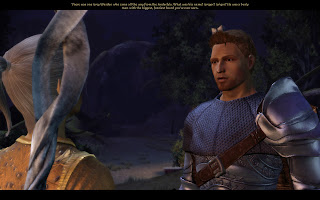Party NPCs are typically the player's companions on their journey. Frequently they exist from the start (or fairly early on in the adventure) until towards the very end of the game. Obviously there are exceptions to this where they may only arrive late in the piece or be killed off part way through for dramatic effect, but usually they provide the ongoing character support during the game. They provide constant assistance in combat, dole out advice, and potentially play an important role in story events. They can serve the atmosphere by reinforcing the danger of a situation, or by providing levity to lighten the mood and amuse the player.
Have you ever licked a lamp-post in winter?
Party NPCs should be strong characters because they have the potential to be with the player as they experience the events of the game. They are not the mentor NPC waiting patiently for the player to return to talk to them. They are not the antagonist waiting for the player to seize the opportune moment and kill them. However, they can fulfill the vital role of acting as the player's window into the world. As the player frequently needs to be educated about the events or locations in the story, the party NPCs can take on the role of the knowledgeable advisor, telling the protagonist (and hence the player) the vital details they need to know. As ongoing companions, they can dole out the information in small chunks throughout the game, rather than forcing the player to sit through lengthy exposition within a single conversation.
More importantly, many players will seek some sort of emotional connection with the gameworld they are playing, and this primarily comes through the characters within the adventure. The party NPCs are the prime candidates to play this part within the drama, and if written well, many players will come to think of the party NPCs as their friends, truly fulfilling the role of companion during the game.
"Talimancers" are among the most devout fans in gaming
This is no small contributing factor to the development of romances in RPG games, as allowing a romance to play out with a party NPC only serves to heighten a player's emotional connection with a game. The amount of fan adoration of characters within games may at times be slightly concerning, but this only demonstrates how powerful the ability to create an emotional connection with these NPCs can be. The player that does everything they can to protect the life of their virtual love interest within the game is very strongly invested in the game - it is engaging in a way that it would not otherwise be.
It is evident that party NPCs present an excellent means to help produce a more engaging story and gaming experience for players. However, this is reliant on the player being able to form a connection with these characters and be able to think of them as realistic entities within the game. Thus they must be constructed such that they are presented with believable personalities, and allowed to interact with the player in a meaningful fashion. However, those are topics for another time...






No comments:
Post a Comment